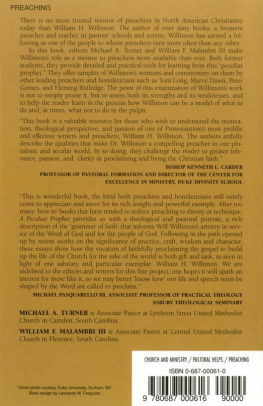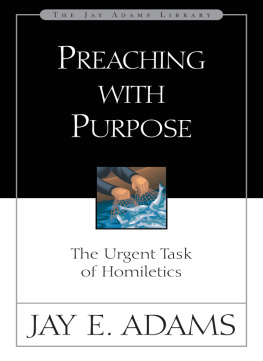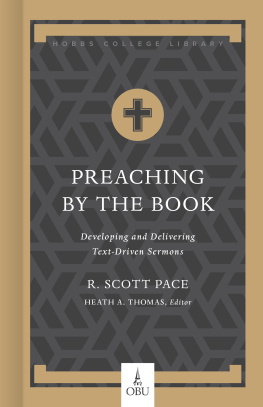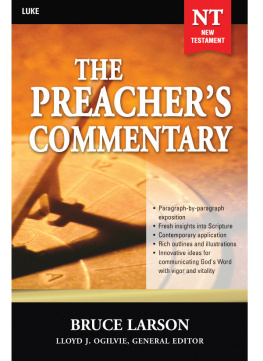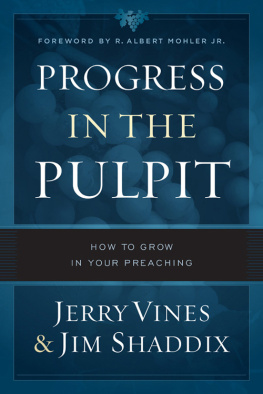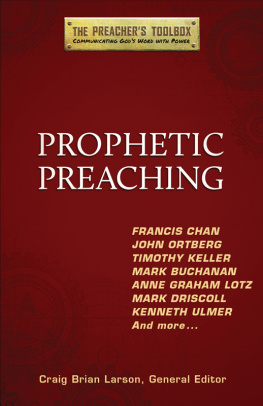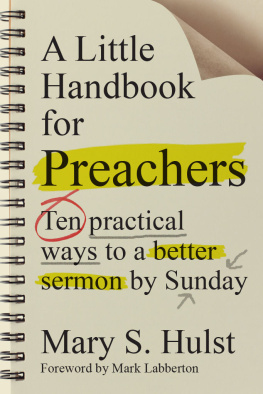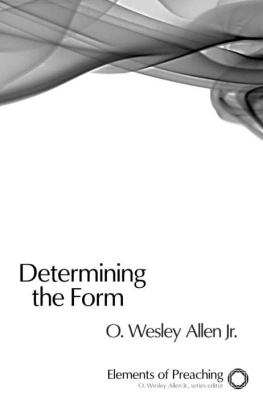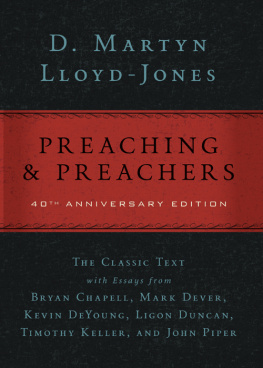A PECULIAR PROPHET
WILLIAM H. WILLIMON AND THE ART OF PREACHING
Copyright 2004 by Abingdon Press
All rights reserved.
No part of this work may be reproduced or transmitted in any form or by any means, electronic or mechanical, including photocopying and recording, or by any information storage or retrieval system, except as may be expressly permitted by the 1976 Copyright Act or in writing from the publisher. Requests for permission can be addressed to Abingdon Press, P.O. Box 801, 201 Eighth Avenue South, Nashville, TN 37202-0801, or e-mailed to permissions@abingdonpress.com.
This book is printed on acid-free paper.
Library of Congress Cataloging-in-Publication Data
A peculiar prophet : William H. Willimon and the art of preaching / edited by
Michael A. Turner and William F. Malambri III.
p. cm.
Includes bibliographical references and index.
ISBN 0-687-00061-0 (binding: adhesive perfect : alk. paper)
1. Willimon, William H. 2. Methodist ChurchSermons. 3. Preaching. I. Willimon,
William H. II. Turner, Michael A., 1975- III. Malambri III, William F., 1974
BX8333.W46P43 2004
251.0092dc22
2004009485
All scripture quotations unless noted otherwise are taken from the New Revised Standard Version of the Bible, copyright 1989, by the Division of Christian Education of the National Council of the Churches of Christ in the United States of America. Used by permission. All rights reserved.
Scripture quotations marked (RSV) are taken from the Revised Standard Version of the Bible, copyright 1946, 1952, 1971 by the Division of Christian Education of the National Council of the Churches of Christ in the United States of America. Used by permission. All rights reserved.
04 05 06 07 08 09 10 11 12 1310 9 8 7 6 5 4 3 2 1
MANUFACTURED IN THE UNITED STATES OF AMERICA
CHAPTER 1
WHY WILLIMON?
Michael A. Turner
Our Current Homiletical Milieu
A t the beginning of the twenty-first century, the art of preaching is in peril. The problem is not that there are fewer preachers than at any other time in the life of the churchthough many denominations are suffering from shortages of clergy. Rather, assaulted on all sides, preachers in this peculiar time lack sufficient theological resources and ecclesial practices to produce preaching worthy of the name.
Part of the problem is that modern Western culture is detrimental to the practice of preaching. Entertainment reigns. Having lost our desire to be saved, we want simply to be amused. Desperate to be relevant in what has been dubbed the MTV age, many preachers have sought to stay atop their games, not by digging in, doing serious study, opening the pages of the Early Church Fathers and Mothers, delving more deeply into scriptural exegesis, and becoming more theologically and biblically sound, but rather by latching onto the latest technological developments and gadgetry of the entertainment industry.
Consumerism, like the entertainment culture, also threatens the art of preaching. In fact, even more ubiquitous and insidious than our penchant for entertainment, is the ever-expanding, all-encompassing market. More and more, the market seems to drive everything, including the practices of the Church and its pastors. When the rest of the world is geared toward user-friendliness and pleasing the consumer, the truth of the gospel can be bad business.
The therapeutic, on the other hand, is good business. So much of preaching, when it is not driven by our desire for entertainment, is driven by the therapeutic culture in which we live. Bookstores sell self-help books by the thousands.
However, the effects of the market do not stop there. If anything has a market these days, it is information. The Internet and other tools of information dissemination have placed at our fingertips far more information than can ever be digested or retained. That is good news for the preacher who legitimately desires to research and study. The Internet, however, can also open up a wilderness full of temptations.
Bereft of a strong sense of vocation and busy trying to be all things to all people, many pastors have found the Internet to be a shortcut to sermon preparation. Every day new Web sites pop up, offering to solve all clerical time management woes by rescuing pastors from the onus of sermon preparation. Given the proliferation of preaching crutches available on the Internet, it would not be surprising if even www.justtoolazytoprepare.com became a resounding success.
At their best, such Web sites offer some semblance of a communityalbeit a virtual onein which to engage in discourse about the preaching task and particular Scripture passages. However, at their worst, such sites have endangered the preaching ministry of the church in a number of ways, not the least of which has been to encourage plagiarism. Moreover, it is hard to imagine how a sermon written by someone in a completely different ecclesial context can truly engage a people for whom it was not designed. Without a doubt, trite, sappy, acontextual Internet sermons are no substitute for artful, engaging encounters with Scripture, encounters borne only through homiletical disciplines.
Just the other day, I received in the mail an advertisement for a sermon publication. Too busy to write sermons? Let us do it for you. Sermons written by pastors for pastors. Not only encouraging plagiarism but also fostering intellectual laziness, the morality of such resources is not the morality of the Church.
However, because of the demise of imaginative preaching, some laypeople prefer prepackaged Internet homilies to the real thing. Not too long ago, I was discussing the sermonic sloth and plagiaristic tendencies of many pastors with a friend who is a Catholic layperson. His response: I wish our priest would get his sermons off the Internet! At least then they would be tolerable, and I would know that he had done some preparation before stepping into the pulpit. Taking the time to print out a sermon is better than no preparation at all.
One can see his point. Internet theology warmed up and served again can be better than no theology at all. However, passing off anothers work as ones own is nothing short of lyingsinning.
Artful preaching takes time and intellectual labor. Imagination requires cultivation and hard work. To the world, the time required to cultivate imagination and prepare to preach may look like a waste. But, to borrow from Marva Dawns description of worship, it is a royal waste.
Given the current cultural and homiletical milieu, preachers who truly desire to be artisans face an ominous task. We need many things: vocational clarity, accountability, discipline, theological formation, and so forth. But perhaps that which is most needed by preachers today is role models, mentors. Preachers are groping for master craftspersons who embody the virtues; who stand firm against the cultural currents of consumerism, entertainment, and the therapeutic; who take seriously the vocation to preach and do the necessary but difficult work to prepare their minds and souls to fulfill their vocation. Such craftspersons are needed to teach pastors the moves, gestures, and practices that produce Christian preaching worthy of the name.
Those seeking to be homiletical artisans must be willing to learn the craft by becoming apprentices to master craftspersons. Imitation is a great teacher. All preachers can point to those saints gone before who have influenced their proclamation. Great preachers are those who have been able to assimilate the virtues of those saints into their own preaching life. The great orator Martin Luther King Jr. even memorized entire sermons of great preachers. Then, he delivered them to mirrors and fellow homiletical students, mimicking the style, parroting the pacing, and perfecting the pronunciation and art of the preachers he admired.

